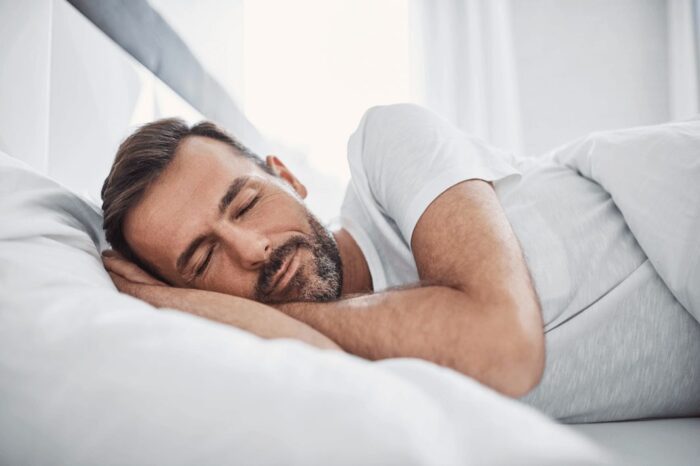Do you snore? Do you often wake up multiple times a night to catch your breath? You may have sleep apnea. During sleep apnea, patients breathing stops and starts, potentially hundreds of times per night. The soft tissue in the mouth and throat momentarily closes the airway, obstructing breathing. We can treat sleep apnea in our Arlington Heights, IL office. If you suspect that you may have sleep apnea but want to know more, we welcome you to read answers to common questions about this health and dental concern.

Q&A: Sleep Apnea in Arlington Heights
Learn more about sleep apnea treatment with answers to these commonly asked questions:
What are sleep apnea risk factors?
Older patients, male patients, and patients who have excess weight may be more likely to develop sleep apnea. Neck circumference can make it easier for soft tissues to block the throat. There is a 3.2% prevalence of sleep apnea in men 20-44 years old, while this percentage rises to 11.3% in men 45-64 years old. Fatty deposits in the head and neck can develop as patients age. Differences in the airway can also increase males’ risk of developing sleep apnea.
Do I have sleep apnea if I snore?
Not everyone who snores has obstructive sleep apnea (OSA). Vibrations in the airway lead to snoring. Obstructed airways cause pauses in breathing during sleep, or sleep apnea. However, patients with sleep apnea can also snore.
Do I need a CPAP machine?
We recommend Continuous Positive Airway Pressure (CPAP) machines for patients with moderate to severe sleep apnea symptoms. CPAP machines provide airflow through the airway, so patients do not experience periods of apnea throughout the night. However, a custom nightguard can benefit patients with mild sleep apnea symptoms.
How does a nightguard help sleep apnea patients?
A nightguard is an oral appliance that covers teeth. We custom-make nightguards for sleep apnea patients. A sleep nightguard brings the lower jaw forward to open up the airway. Nightguards are a great alternative to CPAP machines for patients with sleep apnea.
Can my sleeping position impact sleep apnea symptoms?
Patients who sleep on their sides or stomachs can help keep their airways open during sleep. Sleeping on more elevated pillows can help sleep apnea patients.
Are you noticing symptoms like daytime sleepiness or insomnia? Do you or your partner snore? Treat sleep apnea today. Call (847) 230-9703 or schedule a dental appointment with Dr. Brent Engelberg online. If you have any remaining questions about sleep apnea treatment, please let us know at your next visit.
